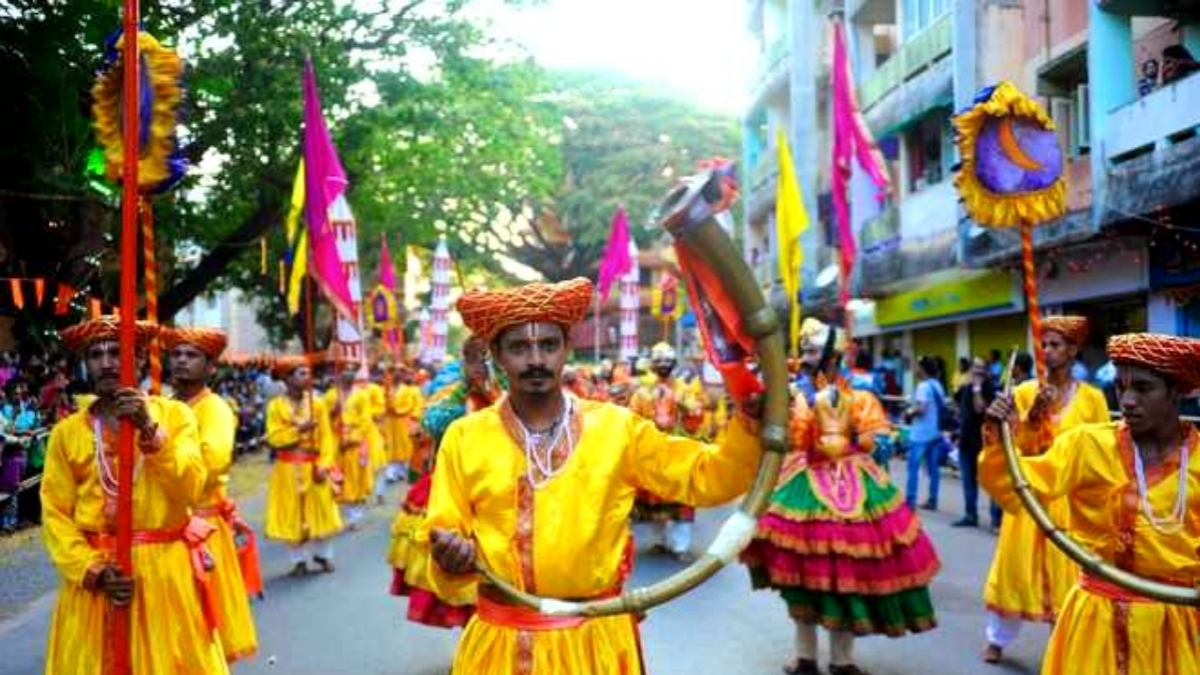Shigmo Festival is celebrated in the smallest union territory of India – Goa. With the onset of spring season, this festival marks celebrations in the Konkani part of Goa, in which Hindus delight in a colorful extravaganza. The festival is celebrated for five days, beginning with Holi.

During the festival, people paint intricate murals and carve idols that illustrate characters from Hindu mythology. Also known as Shigmotsav, the festival is celebrated in the month of Falgun as per Saka Calendar. Famous temple yatras take place during the festival and processions at the temples add zing to it. People throw gulal on each other and dance with deities’ umbrellas. Here’s the ultimate guide to Shigmo.
When is Shigmo Festival Celebrated?
We start this guide to Shigmo with the dates for this year. Shigmo Festival is celebrated a few days before the full moon night of the Indian lunar month of Phalgun, which is generally in the month of March. The celebrations culminate on the full moon night that marks the beginning of Vhadlo Shigmo for the next few days. Thereby, the festival has two variants – Dhakto Shigmo and Vhadlo Shigmo that are enjoyed consecutively.
History of Shigmo Festival
History of Shigmotsav can be traced from Puranic legends. First legend states that it is celebrated to the burning of the evil aunt Holika, who wanted to get her religious nephew – Prahlad burnt to death. Some also believe that this day marks the death of Putana by Lord Krishna.
The more believed legend of this festival states that Shigmotsav is celebrated as a tribute to Kamadeva – the Hindu god of love. It is said that Kamadeva somehow disturbed Lord Shiva when He was in penance. It also commemorates the return of the warriors who have left after Dussehra for a battle with the invaders. Another reason for celebrations is the ripening of the winter crops. Hence the festival is also known as the harvest festival.
The term ‘Shigmo’ is derived from a Prakrit word – Suggimaho and the Sanskrit word – Sugrishmaka. In different parts of the country, it is celebrated with different names. It is known as Holi in North India, Kamadahan in South India, Dolyatra in Assam and Bengal, and as Shimga in Maharashtra.
Significance of Shigmo Festival
The rural class celebrates the Shigmo festival as they believe it brings good luck. It is noteworthy that Dhakto Shigmo is believed to be celebrated by the rural masses, whereas everyone celebrates Vhadlo Shigmo, which has greater significance. Also known as the festival of colors or spring festival for Goans, the festivities span over a fortnight.
The locals are in high spirits and the environment oozes merriment and revelry. The jollity all around and the folklore infused atmosphere enables you to soak in the festive cheer. The region is beautifully illuminated. Thus, a Goa visit is recommended during the festival to enjoy the raw and real viewpoint on the folklore and the locals.
Celebrations of Shigmo Festival
Shigmotsav celebrations in Goa are unmissable that include folk dances, parades, and a joyful play of colors. People smear colors on each other in the gleeful celebrations. Houses are beautifully adorned to welcome the festive delight. It seems as if the Western Ghats are bathed in several hues and come alive during the Shigmo Festival. This guide to Shigmo will also cover the numerous colours and festivities of this unique Goan festival.
People are clad in glitzy and colorful traditional costumes. Martial dances like ‘Ghode-modni’ or the horse dance, ‘Romtamel’, and ‘Fugdi’ dances are performed. A majority of the dances can be witnessed in rural parts of Goa during Dhakto Shigmo, which are performed by the farmers and the rural class at night. If you somehow missed the dances, you can enjoy their flavor at the procession – the festival highlight, which is backed by the Goa Government.
Painted idols and illustrations showcasing a number of episodes from folklore and mythological stories are highlighted during the parade. Floats portraying the themes from ancient Hindu scriptures entice the crowd. Being a part of the parade, even the tourists can appreciate the festive essence.
The procession is carried out in different cities that attracts tourists to the joyous celebrations. Traditional Goan dances and modern floats are something you will witness only during Shigmotsav. Kamadeva is largely honored during the festivities. The best performer and the best float decorators are honored.
In a nutshell, the Shigmo festival of Goa beckons you to a lovely and enthralling experience with the exclusive opportunity to experience Goa at its best. The efforts invested to make the celebrations remarkable transform the festival into a memory to treasure. So, if your wanderlust invokes you for something unique and unforgettable, visit Goa during spring to get the true flavors of this raw fiesta, which is Shigmo Festival.
Shigmo Festival In 2022
Shigmo Float Parades will be held at five prominent places in Goa, starting on March 19 March 2022 at Ponda. On 20 March 2022 at Margao. On 22 March 2022 at Vasco. The Panaji Shigmo Parade will be held on 26 March 2022 and at Mapusa on 27 March 2022.
The Shigmo Parade will commence at 4.00 p.m. and will conclude at 10.00 p.m. following strict COVID Protocol. The constitution of Shigmo Committees for respective centres, Route of Parade, Prizes for Shigmo Parade will be announced soon. Tell us how you liked this guide to Shigmo in the comments below.


